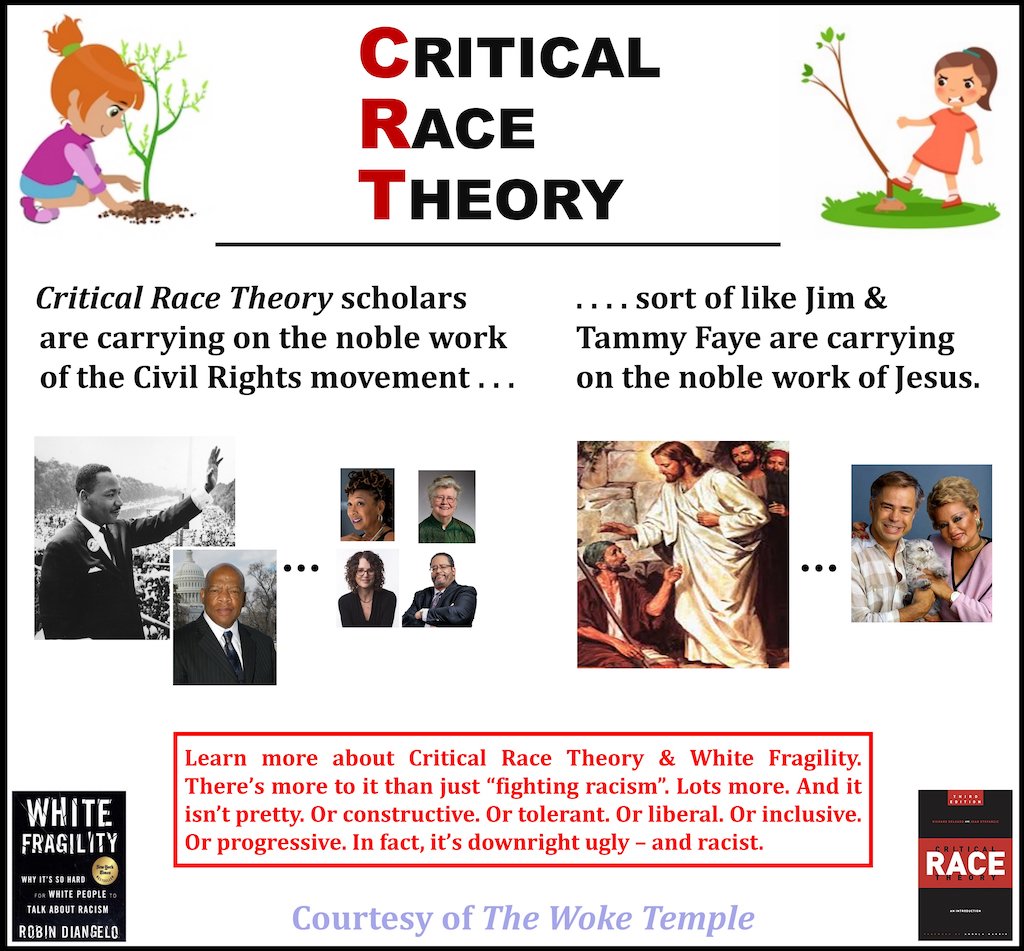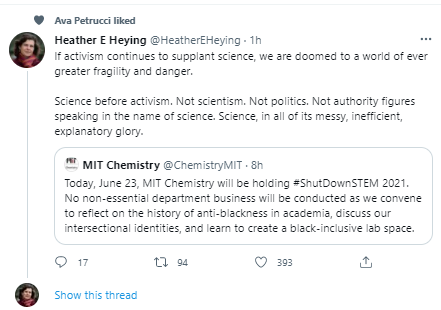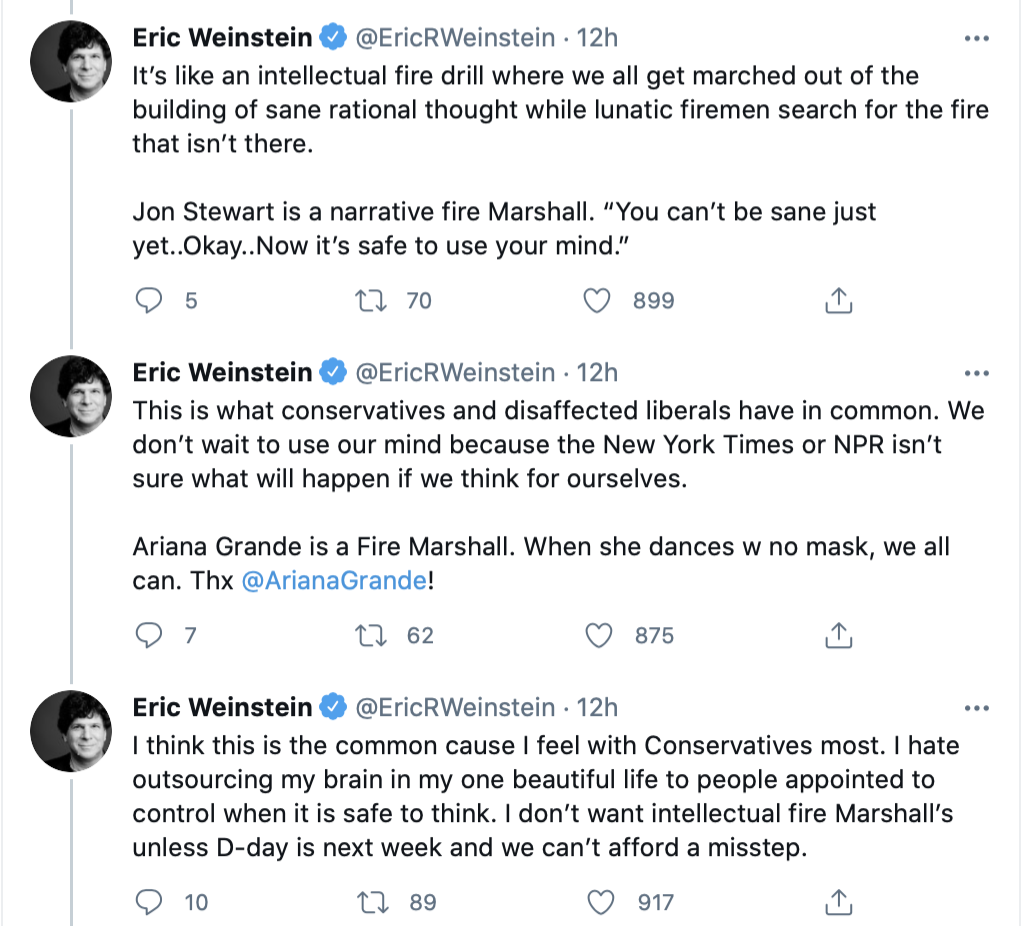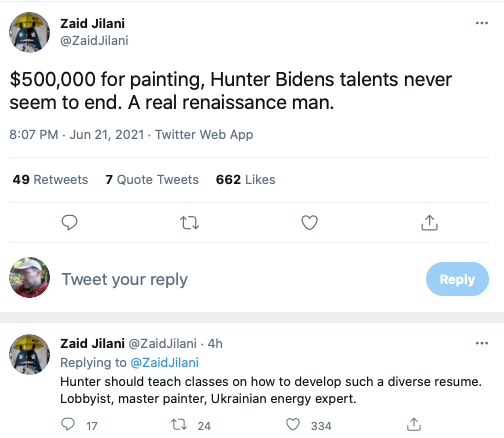What is “Critical Race Theory”?
Andrew Sullivan keeps noticing the sterilzed version of CRT that the woke-permeated legacy media is promoting. They often refer to CRT as "teaching history. They can't see it accurately because they don't want to see how CRT plays out in classrooms. Sullivan's article is titled "Don't Ban CRT. Expose It: There's a liberal way to fight illiberalism. And it's beginning to work." Here is an excerpt:
The stories in the mainstream media this past week about the broadening campaign to ban critical race theory in public schools have been fascinating — and particularly in how they describe what CRT is. Here’s the Atlantic’s benign summary of CRT: “recent reexaminations of the role that slavery and segregation have played in American history and the attempts to redress those historical offenses.” NBC News calls it the “academic study of racism’s pervasive impact.” NPR calls CRT: “teaching about the effects of racism.” The New York Times calls it, with a straight face, “classroom discussion of race, racism” and goes on to describe it as a “framework used to look at how racism is woven into seemingly neutral laws and institutions.”
How on earth could merely teaching students about the history of racism and its pervasiveness in the United States provoke such a fuss? No wonder Charles Blow is mystified. But don’t worry. The MSM have a ready explanation: the GOP needs an inflammatory issue to rile their racist base, and so this entire foofaraw is really just an astro-turfed, ginned-up partisan gambit about nothing. The MSM get particular pleasure in ridiculing parents who use the term “critical race theory” as shorthand for things that just, well, make them uncomfortable — when the parents obviously have no idea what CRT really is.
I highly recommend a full read of Sullivan's article. He offers many useful links along the way.
[Added 6/23/2021 - 9 pm CT]
What is CRT? Daily Wire offers this description, which comports with my understanding:
Critical race theory, of course, is not America’s actual history. It is a perverse worldview, unsupportable by the evidence, in which all of America’s key institutions are inextricably rooted in white supremacy; it is an activist campaign demanding the destruction of those institutions. The founders of CRT have written as much. According to CRT founders Richard Delgado and Jean Stefancic, CRT is founded on two key premises: that “racism is ordinary, not aberrational — ‘normal science,’ the usual way society does business, the common, everyday experience of most people of color in this country”; second, that “our system of white-over-color ascendancy serves important purposes, both psychic and material.” This means, according to Delgado and Stefancic, that “racism is difficult to cure or address” and that a formal commitment to legal equality on the basis of color-blindness is merely a guise for further discrimination. Furthermore, CRT founders say that whites are unable to understand racism, and that “minority status … brings with it a presumed competence to speak about race and racism.”
CRT therefore holds that racism is embedded deeply in American life, unconsciously into white American psyches, and that it is impossible for white Americans to understand their own racism or that of the system, let alone to remove it. The only solution: tearing away the only systems that have ever provided widespread liberty and prosperity. As fellow CRT founder Derrick Bell wrote, “The whole liberal worldview of private rights and public sovereignty mediated by the rule of law needed to be exploded.”
Are many schools pummeling their students with Critical Race Theory? They are, which is causing many schools to come under increasing scrutiny. As of late, many woke institutions have started claiming that schools are merely teaching "race history," and that those who are appalled by what is going on in many American schools don't understand what Critical Race Theory is. To that, I offer the following: A) I invite readers to check out the leaked teaching materials and first-hand accounts from many schools; and B) Consider that if it walks like a duck and quacks like a duck, it is a duck. I strongly oppose CRT for many reasons, especially these three:
Question: Is Critical Race Theory racist?With regard to Reason #2, "The Woke Temple" coarsely (but accurately) describes it:Answer: Yes.
Critical Race Theory begins by asserting the importance of social significance of racial categories, rejecting colorblindness, equality, and neutrality, and advocating for discrimination meant to “level the playing field.” These things lead it to reproduce and enact racism in practice. It also explicitly says that all white people are either racist or complicit in the system of racism (so, racist) by virtue of benefiting from privileges that they cannot renounce.
. . .
Question: Does Critical Race Theory advance the vision and activism of the Civil Rights Movement?
Answer: No.
Critical Race Theory refers to that vision as “traditional approaches to civil rights” and calls it into question. The Civil Rights Movement called for living up to the foundational promises of the United States (and other free nations) and incrementally changing the system so that those original ideals were met. Critical Race Theory rejects incrementalism in favor of revolution. It rejects the existing system and demands replacing it with its own. It rejects the liberal order and all that goes with it as being part of the system which must be dismantled and replaced. It is therefore fundamentally different than the Civil Rights Movement (and is explicitly anti-liberal and anti-equality).
. . .
Question: Does Critical Race Theory say that all white people are racist?
Answer: Yes.
More specifically, Critical Race Theory says that all white people are either racist or that they are complicit in a “system of racism” (so, racist) that they wittingly or unwittingly uphold to their own benefit unless they are “actively antiracist” (and usually even then). Those benefits of “whiteness” are labeled “white privilege” in general and are said to be outside of the scope of things that white people can intentionally renounce. The most they can do is “strive to be less white” and to become aware of and condemn “whiteness” as a system.
 [More . . . ]
[More . . . ]




